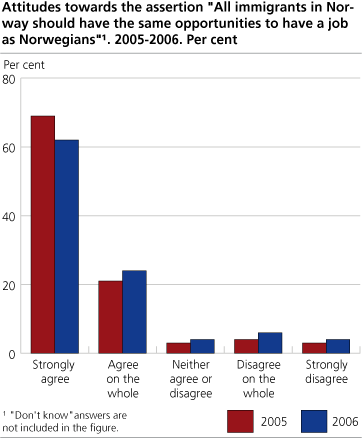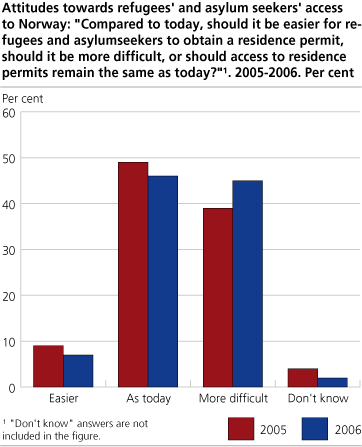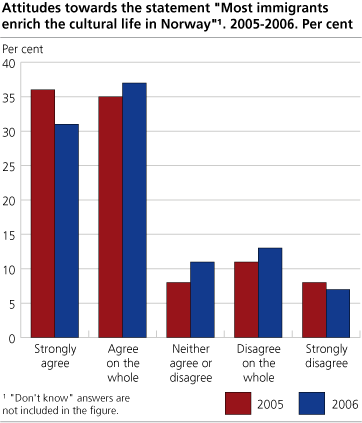Content
Published:
This is an archived release.
Attitudes return to 2004 level
The number of people who believe that immigrants and Norwegians should have the same opportunities in the labour market has fallen since 2005. Four out of ten questions on attitudes towards immigrants and immigration show that we have become less tolerant.
The changes in attitudes can be interpreted as an adjustment of last year’s findings. Last year's findings may have been based on a somewhat biased sample with a slight overrepresentation of respondents with a positive attitude towards immigrants, or the public opinion has returned to the level of attitudes measured in 2004. Compared to the 2004 survey, there are few or no major changes.
Same opportunities in the labour market: A shift from “strongly agree” to “agree on the whole”
The proportion of people who strongly agree with the statement that immigrants should have the same opportunities in the labour market as Norwegians fell from 69 per cent in 2005 to 62 per cent in 2006. At the same time, the proportion of people who agree on the whole increased from 21 to 24 per cent. The proportion of people who disagree strongly or on the whole rose from 7 to 10 per cent.
Refugee policy. More people want a restrictive policy
The survey disclosed increased support for a more restrictive refugee policy. The proportion of people who want to make it more difficult for refugees and asylum seekers to obtain a residence permit, increased from 39 per cent in 2005 to 45 per cent in 2006. 7 per cent think it should be easier for refugees and asylum seekers to obtain a residence permit, a decline of 2 percentage points since 2005. 46 per cent think the access to residence permits should remain the same as today. In 2005, this figure was 49 per cent.
The 2006 survey also shows less support for the statement that most immigrants enrich Norway's cultural life and somewhat greater support for the statement that it would be uncomfortable to have a domestic help with immigrant background. The size of the changes was however modest, 3 and 2 percentage points respectively. In total, 68 per cent of the population agree that immigrants enrich Norway's cultural life, while 20 per cent disagree. In addition, nine out of ten seem to be indifferent to whether a domestic help is an immigrant or not.
Liberal attitudes in European perspective
The results of the European Social Survey 2002-2003 and 2004-2005 on attitudes towards immigrants show that attitudes towards immigration and immigrants are rather stable in Norway. The data show that roughly three out of four think that "many” or “some” immigrants of the same race or ethnic group as the majority should be allowed to reside in the country. In this respect, Norway is number six in a ranking with 23 other European countries. The proportion of people who want to receive many or some immigrants falls to six out of ten when the question is about people of a different race or ethnic group than the majority. On this question, Norway ranks as number eight.
Three out of ten people in Norway are of the opinion that immigration is generally a good thing for the economy of the country, while five out of ten believe that immigration is not particularly good or bad for the economy. The attitude towards the cultural impact of immigration is somewhat more optimistic. More than four out of ten think that immigrants enrich the Norwegian culture, while four out of ten think that immigration neither undermines nor enriches Norwegian culture. On these questions, Norway ranks as number six and eight respectively.
Neither “better or worse” to live in the country as a result of immigration
Greater scepticism is registered in the answer to the question whether the country has become a worse or better place to live due to immigration. Two out of ten think life has become better, and one out of four thinks it has become worse. More than half of the population prefer a neutral position somewhere in the middle. On this question, Norway ranks in the middle among the 23 countries.
The results of five out of six question in the second round of the European Social Survey show that Norway is one of the most immigration friendly countries in Europe. Sweden and Iceland are more liberal than Norway, while the attitudes in Denmark and Finland vary somewhat from question to question. People who live in countries with considerable labour immigration, such as Switzerland and Luxembourg, appreciate immigrants' contribution to the economy and cultural life more than people in Norway. In the UK, France and Germany, people are overall more sceptical.
Tables:
- Table 1 Attitudes towards six statements on immigrants, 2002-2006. Per cent
- Table 2 Attitudes towards the statement "All immigrants in Norway should have the same opportunities to have a job as Norwegians". 1993-2000 and 2000-2006. Per cent
- Table 3 Attitudes towards refugees access to the country. 2002-2006. Per cent
- Table 4 Answers to three questions on relation to immigrants. 2002-2006. Per cent
- Table 5 Contact with immigrants on different arenas. 2002-2006. Per cent
- Table 6 Number of arenas where contact with immigrants takes place. 2002-2006. Per cent
- Table 7 Number of immigrants one has contact with. 2003-2006. Per cent
Contact
-
Frøydis Strøm
E-mail: froydis.strom@ssb.no
tel.: (+47) 40 81 13 17
-
Christian Sørlien Molstad
E-mail: christian.molstad@ssb.no
tel.: (+47) 46 65 99 12



